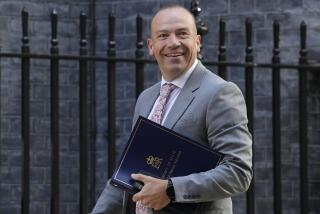Exceeds Casualties From Sectarian Violence : Toll of N. Ireland’s Road Deaths
- Share via
BELFAST, Northern Ireland — The nation makes world headlines with grim tales of sectarian killings, but the death toll from one of the century’s longest guerrilla conflicts is dwarfed by the annual carnage on Northern Ireland’s roads.
Traffic accidents account for twice as many deaths here.
Last year, 93 people were killed in Northern Ireland’s sectarian and political conflict as the Irish Republican Army battled to oust Britain.
Meanwhile, on the roads, 214 people died.
So the British authorities have launched a media campaign to hammer home the message to the province’s 1.5 million citizens.
Commercials preaching “Take heed--don’t speed” and “Drinking and Driving Wrecks Lives” are aiming to make the roads safer.
Television, radio and newspapers are bombarding the public with messages. Road safety lectures are being delivered to 200,000 school children.
Northern Ireland Environment Minister Richard Needham said:
“The trend, based on a 5-year average, has been gradually downward since 1977, but nevertheless we seem to be stuck around the 200 level . . . and this is still far too high.”
He said the estimated cost of road casualties increased by 50% from 1985 to 1986--”a horrifying cost both to the public and government, which could have been so much better spent elsewhere.”
He expressed particular concern over the increased number of children killed in road accidents and the fact that the overall fatality rate in Northern Ireland is far worse than it is in mainland Britain.
Dr. Gavin Lavery, consultant anesthetist at Belfast’s Royal Victoria Hospital, said, “Many people in the intensive care unit expect a huge number of cases would come from sectarian violence. In fact, they are outnumbered 5 to 1 by road accident cases.”
Lavery suggests that Northern Ireland’s bloody conflict--almost 3,000 people have died and 30,000 have been injured in the last 20 years--may help to explain the high death toll on the roads.
“Our standard of driving is certainly much lower than it is in the rest of the United Kingdom. This is largely due to the fact that our police force is so busy doing other things.
“Road safety, breathalyzers, checks on cars have to take a back seat for security reasons. Our police couldn’t set up random checks on remote country roads--that would be far too dangerous.”
He also questioned the roadworthiness of Northern Ireland’s cars, which until recently did not have to undergo any safety checks until they were 7 years old.
Lavery also highlighted one of the ironies of Northern Ireland. Hospitals have developed expertise to deal with the bloody casualties of sectarianism--and they use those surgical skills to benefit road accident victims.
“If I had to have a road accident, I would much rather have it in Belfast than I would in Edinburgh or Manchester,” he said.
Medical experts from North America, western Europe and Australia come to study the techniques of the Royal Victoria Hospital.
Surgeons and doctors who live on the front line of sectarian violence have developed techniques to deal with trauma victims.
A teen-age soldier with his skull shattered by a high-speed bullet has a titanium plate inserted in his head. Victims “knee-capped” in punishment shootings have their broken blood vessels meticulously repaired so they can walk again.
Car bomb victims are put on floating air beds with their wounds cleaned up but left open to avoid gangrene.
“Surgeons of various specialties have got a wealth of experience that they could not have gained anywhere else in the world,” Lavery said.
He confessed that dealing with the constant sectarian killings and bomb attacks on police and troops “tends to cause me more mental anguish. Road traffic accidents don’t fill me with a sense of fatality. The rest of the world is having those too.”
More to Read
Sign up for Essential California
The most important California stories and recommendations in your inbox every morning.
You may occasionally receive promotional content from the Los Angeles Times.













